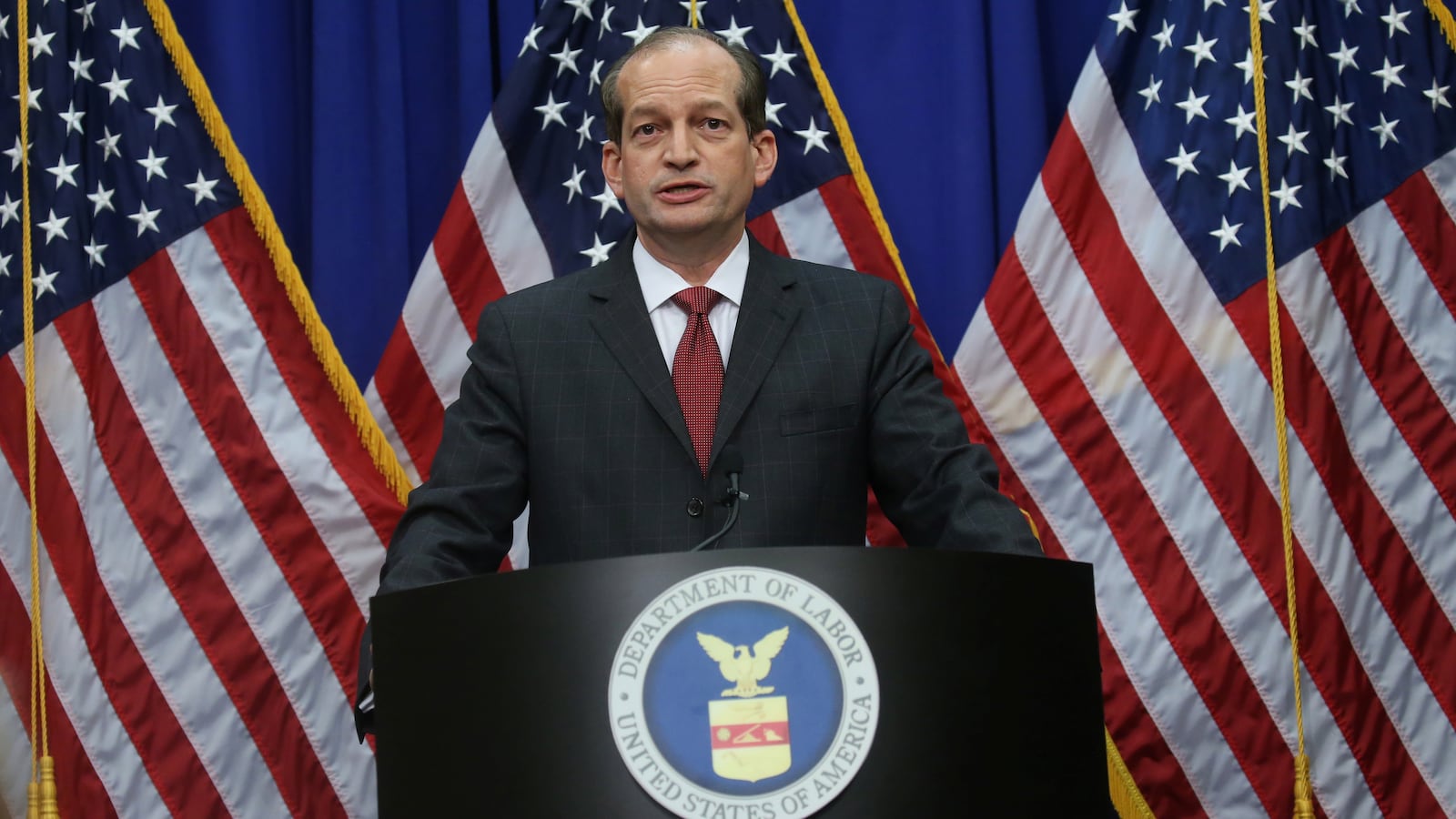Editor's note: On August 10, 2019, Jeffrey Epstein died in an apparent jailhouse suicide. For more information, see The Daily Beast's reporting here.
Alexander Acosta portrayed himself as the hero of the Jeffrey Epstein case on Wednesday and blamed everyone else involved for letting the alleged serial abuser of girls get away with a slap on the wrist.
During a charged press conference Wednesday, the labor secretary defended his decision when he was a federal prosecutor last decade not to prosecute Epstein—a move that has led to calls for his resignation and a demand by President Donald Trump to get in front of cameras and defend himself.
“We believe that we proceeded appropriately,” Acosta said.
Epstein, 66, was arrested by federal authorities in New York on Saturday and charged with sex trafficking crimes for allegedly luring girls with cash to his Manhattan mansion before sexually abusing them.
“I’m pleased that the New York prosecution is going forward,” Acosta said. “His acts are despicable and the New York prosecution affords an opportunity to more fully bring Jeffrey Epstein to justice.”
The new allegations, which Epstein denies, are almost identical to those made a decade ago in Florida where he was accused of preying on girls at his Palm Beach estate. Acosta blamed Florida prosecutors for botching the original case against Epstein and said he was the one that saved it.
In 2007, Acosta was the U.S. attorney in southern Florida and struck a non-prosecution deal with Epstein after issuing him an “ultimatum”: plead guilty to a state charge or else face graver federal charges.
“Simply put, the Palm Beach State Attorney’s office was willing to let Epstein walk free, no jail time, nothing,” Acosta said. “Prosecutors in my former office found this to be completely unacceptable and they became involved.”
Former Palm Beach State Attorney Barry Krischer disputed Acosta’s claim, saying his “recollection of the matter is completely wrong.” In a statement released shortly after Acosta’s press conference, Krischer said the indictment against Epstein fell apart after “secret negotiations” between Acosta and Epstein’s lawyers that state prosecutors were excluded from.
“If Mr. Acosta was truly concerned with the State’s case and felt he had to rescue the matter, he would have moved forward with the 53-page indictment that his own office drafted. Instead, Mr. Acosta brokered a secret plea deal that resulted in a Non-Prosecution Agreement in violation of the Crime Victim’s Rights act,” Krischer wrote, adding that Acosta should not be allowed to “rewrite history.”
Epstein was charged by Florida prosecutors in 2007. It was the threat of federal prosecution, Acosta claimed, that convinced Epstein to plead guilty in state court to a heavier charge of soliciting prostitution. Epstein was sentenced to 18 months behind bars as a result, serving 13 before he was released. (The sentence included “work release” that let Epstein leave prison daily. Acosta blamed the cushy terms on Florida authorities.)
Acosta said passing on certain prison time to try and convict Epstein in federal court would have been akin to a “roll of the dice.”
“The goal here was straightforward: put Epstein behind bars, ensure he registered as a sexual offender, provide victims with the means to seek restitution, and protect the public by putting them on notice that a sexual predator was in their midst,” Acosta said.
Acosta’s office also extended the agreement to Epstein’s four co-conspirators, but said he would not have if prosecutors suspected them of personally abusing children.
One of Epstein’s alleged victims, Courtney Wild, told ABC News this week that she “never felt like the U.S. attorney was on my side.”
In defending himself, Acosta took the standard Trumpian approach: Don’t back down, double down, command the news cycle. This was no accident. Prior to Acosta taking the stage, Trump had privately urged him to hold the press conference so Acosta could be seen fighting back in public, according to a New York Times report confirmed by The Daily Beast.
A source with direct knowledge of this said that Trump would be monitoring coverage of Acosta’s performance “very closely” and that the president’s continued support will depend largely on how Acosta manages the political and public-relations fallout in the coming days.
“My relationship with the President is outstanding. I think that he has, very publicly, said that I have his support,” Acosta said on Wednesday.
Acosta’s public defense came a day after Trump defended him, saying he feels “very badly” and he will “look very closely” into Epstein’s plea agreement.
“I feel very badly, actually, for Secretary Acosta because I’ve known him as being somebody that works so hard and has done such a good job. I feel very badly about that whole situation,” Trump told reporters inside the Oval Office on Tuesday, before confirming the White House will be reviewing the case. “We’re going to be looking at that and looking at it very closely.”
Early this year, Trump’s then-press secretary Sarah Huckabee Sanders also said the White House would be reviewing Acosta’s actions after a bombshell Miami Herald investigation that detailed accounts from scores of alleged Epstein victims and the “sweetheart” deal that denied them justice.
Since that announcement, there has been no update on whether the investigation was conducted or concluded, and the White House would not say one way or the other.
“The administration should have gotten rid of Acosta after the original Miami Herald story,” said one former Trump administration official. “Even if he did nothing technically illegal, the optics of the plea deal are awful. To give a monster like Epstein such a friendly deal should disqualify Acosta from ever holding another job in the public sector again.”









